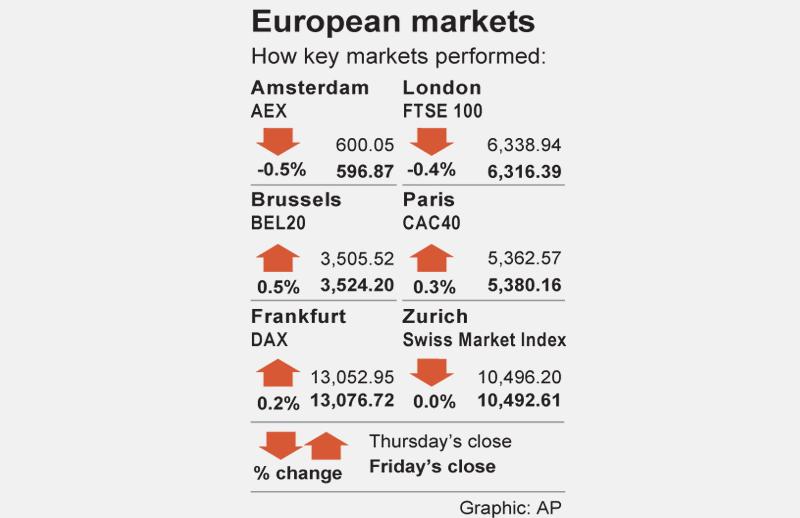European shares ended flat on Friday as surging COVID-19 cases compounded fears of the damage to the bloc’s economy in the coming winter months, although the benchmark index clocked its second straight week of gains.
The pan-European STOXX 600 edged 0.01 percent higher after jumping earlier this week on optimism about a working COVID-19 vaccine.
The index has gained 12.5 percent in the past two weeks, also buoyed by hopes of calmer global trade under US president-elect Joe Biden.

“Even if the greater likelihood of a vaccine has brightened prospects for next year, the near-term economic outlook is still very gloomy,” Capital Economics Ltd Europe economist Jessica Hinds said.
“Much of the eurozone is yet again subject to substantial restrictions on daily life that are taking their toll on economic activity, particularly in parts of the services sector,” Hinds said.
German Minister of Health Jens Spahn said it was too early to say whether restrictions imposed last week would need to be extended beyond this month, while French Prime Minister Jean Castex said there would be no easing for at least two weeks.
German shares rose 0.2 percent, while France’s CAC 40 index gained 0.3 percent after having risen to an eight-month high earlier this week.
Despite rallying more than 40 percent since a coronavirus-driven crash in March, the STOXX 600 is down about 7 percent this year on concerns that the second round of lockdowns would threaten a nascent economic recovery.
The S&P 500, in contrast, has risen 9.5 percent so far this year.
With the eurozone likely heading back into recession this quarter, the European Central Bank has already said it would provide more stimulus next month.
European banking stocks outperformed major sectors surged 16.5 percent this week, while travel stocks, which have lost 25 percent of their value so far this year, ended their second week higher.
Technology stocks, which have tracked a surge in their US peers as investors gravitate toward sectors that have seen higher demand in this year’s stay-at-home environment, gained 0.3 percent on Friday.
French power group EDF SA gained 0.4 percent as it showed signs of improving performance in the third quarter, while German property group Deutsche Wohnen AG fell 1 percent after its third-quarter earnings update.
Overall, quarterly results for STOXX 600 companies have been better than expected, with 68 percent of the firms that have reported results so far beating analysts’ earnings estimates, according to Refinitiv data.

UNCERTAINTY: Innolux activated a stringent supply chain management mechanism, as it did during the COVID-19 pandemic, to ensure optimal inventory levels for customers Flat-panel display makers AUO Corp (友達) and Innolux Corp (群創) yesterday said that about 12 to 20 percent of their display business is at risk of potential US tariffs and that they would relocate production or shipment destinations to mitigate the levies’ effects. US tariffs would have a direct impact of US$200 million on AUO’s revenue, company chairman Paul Peng (彭雙浪) told reporters on the sidelines of the Touch Taiwan trade show in Taipei yesterday. That would make up about 12 percent of the company’s overall revenue. To cope with the tariff uncertainty, AUO plans to allocate its production to manufacturing facilities in

Taiwan will prioritize the development of silicon photonics by taking advantage of its strength in the semiconductor industry to build another shield to protect the local economy, National Development Council (NDC) Minister Paul Liu (劉鏡清) said yesterday. Speaking at a meeting of the legislature’s Economics Committee, Liu said Taiwan already has the artificial intelligence (AI) industry as a shield, after the semiconductor industry, to safeguard the country, and is looking at new unique fields to build more economic shields. While Taiwan will further strengthen its existing shields, over the longer term, the country is determined to focus on such potential segments as

COLLABORATION: Given Taiwan’s key position in global supply chains, the US firm is discussing strategies with local partners and clients to deal with global uncertainties Advanced Micro Devices Inc (AMD) yesterday said it is meeting with local ecosystem partners, including Taiwan Semiconductor Manufacturing Co (TSMC, 台積電), to discuss strategies, including long-term manufacturing, to navigate uncertainties such as US tariffs, as Taiwan occupies an important position in global supply chains. AMD chief executive officer Lisa Su (蘇姿丰) told reporters that Taiwan is an important part of the chip designer’s ecosystem and she is discussing with partners and customers in Taiwan to forge strong collaborations on different areas during this critical period. AMD has just become the first artificial-intelligence (AI) server chip customer of TSMC to utilize its advanced

While China’s leaders use their economic and political might to fight US President Donald Trump’s trade war “to the end,” its army of social media soldiers are embarking on a more humorous campaign online. Trump’s tariff blitz has seen Washington and Beijing impose eye-watering duties on imports from the other, fanning a standoff between the economic superpowers that has sparked global recession fears and sent markets into a tailspin. Trump says his policy is a response to years of being “ripped off” by other countries and aims to bring manufacturing to the US, forcing companies to employ US workers. However, China’s online warriors